Aphorisms contain wisdom about the future of grain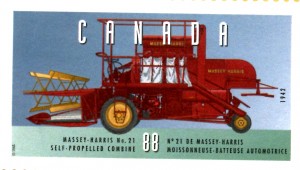
(January 14, 2015) While I was wondering what to put in this space about looking forward to 2015, I received a letter from a long-time friend. Prominent on the envelope’s upper right-hand corner was a postage stamp commemorating the 1942 Massey Harris #21 self-propelled combine. That obsolete machine brought to mind an aphorism often attributed to the 19th century British satirist Oscar Wilde that is particularly applicable to grain farmers – “there is nothing as old-fashioned as the desire to appear modern.”
Perhaps grain farmers are especially inclined to opt for what we see as modern because we are so aware of technological change – our backyards and shelterbelts are often littered with obsolete farm machinery. By the time of the wide-spread adoption of that 1942 combine harvester, Canadian farmers produced nearly 40% of the world’s wheat and had solidified their position of influence in the international grain trade by using freight rate and grain inspection legislation, cooperatives, and the single-desk Canadian Wheat Board to overcome their natural disadvantages of long distances to deep water ports and a globalized oligopoly of grain companies and their agents on the prairies. 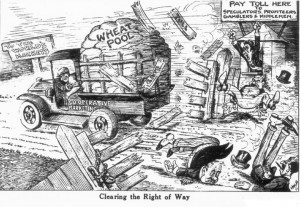
“The more things change the more they stay the same”
Yet in spite of all the technological change since 1942, the structure of the world’s grain trade has hardly changed since the development of the telegraph in the 1850s. The same giant grain companies, many of them still owned by the same families, continue to dominate the international grain trade. Today we know them as the ABCD group (Archer Daniels Midland, Bunge, Cargill, and Louis Dreyfus) plus a fifth commodity trader out of Switzerland known as Glencore that has most of the Canadian grain facilities originally owned by the Wheat Pool Cooperatives built by western farmers and sabotaged by successive Ottawa governments.
One of the more disappointing things about dealing with the small but very vocal anti-Canadian Wheat Board crowd was their determination to ignore the history of their occupation and its implications. Many had swallowed a line that globalization was something new and now that every farmer had a telephone/fax/computer/satellite dish/internet/smart phone, or whatever the latest communications technology of the day was, the world had changed.
Of course the basic economic structure of the grain trade has not changed at all since the 1850s when the ABCD group developed. In consequence those farmers who fell prey to the old aphorism about appearing modern often developed the hubris to think they could actually market their grain better than the collective bargaining of the CWB – a notion grain brokers, the private grain trade, and others with interests in cheap grain, like the Government of Alberta, were all too pleased to cultivate even as these farmers got deeper and deeper into debt.
“Nothing is ever so bad it cannot get worse”
– traditional Norwegian aphorism
For those who did not understand the aphorism about the folly of wanting to appear modern and threw away our market power, western Canadian history offers an illustration of the above Norwegian folk wisdom.
With the single-desk CWB gone, the reality is that western farmers are simply price takers with none of the collective market power we once had. Some farmers still delude themselves that begging for favour from one of the three or so grain companies that have facilities on the prairies amounts to marketing. But the reality is where we once got around 90% of the world grain price, the private trade is now the middle man and has reduced farmers’ share to around 40%. With further consolidation some economists are predicting western farmers will soon be reduced to receiving about 20% of the world grain price.
History shows that even this prediction may be optimistic. When Ottawa took away the 1921 single-desk wheat board, the west saw the rise of larger and larger prairie farms as individuals and investors sought to achieve economies of scale in response to falling grain prices.
Although these Canadian bonanza farms ranged in size from 10,000 acres to the 30,000 acre spread of Charles Nobel near Vulcan and had the benefit of the Canadian Grain Commission, Wheat Pool grain handling cooperatives, and some protection from exploitive rail freight rates, they could not overcome their lack of market power and none of them lasted longer than five years.
Fast forward to today and we have already seen several contemporary bonanza farms fail – one 70,000 acre Saskatchewan based operation leaving creditors holding $46 million in loans. It is no coincidence that without the single-desk Canadian Wheat Board, Canadian wheat is now the cheapest in the world. This brings to mind American comedian Woody Allen’s aphorism that “history may not repeat itself, but it often rhymes.”
So here are my fearless predictions for 2015
- Western Canada will continue to grow the best astro-turf groups in Canada. Readers may recall that astro-turf groups are defined as groups financed by private interests pretending to represent citizens.
- Astro-turf groups like Cereals Canada, having only three actual western farmers sprinkled on its industry-controlled Board of Directors, will continue to lobby for turning cereal grain genomes over to the agro-chemical companies. They have already succeeded in getting grain marketing turned over to the private sector. Your Alberta check-off dollars at work.
- Speaking of astro-turf groups, the Alberta Wheat and Barley Commissions, along with the Manitoba Wheat and Barley Commission will continue with their counterfeit of democratic representation by making sure farmers never get to vote on their members, unless they are willing to travel hours and hours to attend a public meeting. Their theme song will be “why can’t we all just get along” which translates into “why can’t our corporate patrons just get along to the bank with farmers’ money and resources.”
- Saskatchewan’s government will continue to regret allowing Saskatchewan farmers to actually vote for their Wheat and Barley Commission members through a mail-in ballot and will do their best to undermine the democratic representatives of Saskatchewan wheat and barley producers on the Saskatchewan Wheat and Barley Commissions.
- The falling Canadian dollar will increase the price of commodities, since most of them are priced in US dollars. Look for major contortions from astro-turf groups and their private trade masters to explain why Canadian farm gate prices have not jumped in proportion to the decline in the value of the Canadian dollar.
- Almost nobody will ask what exactly the hundreds of thousands of dollars given to Western Canadian Wheat Growers and the Western Canadian Barley Growers Associations by Agriculture Minister Ritz’s department have been used for.
- Look for a major effort to have the so-called rail freight rate cap removed even though it actually gives an incentive to railways to treat grain shippers fairly and allows the railways to make more money, the more grain they move.
- Look for the ruling on the Friends of the Canadian Wheat Board class action law suit. The Friends already have the go-ahead to make the case for recovering what they see as misallocated Pool Account funds, but will the courts allow them to recover the full value of the Wheat Board farmers built and paid for?
- Don’t expect an audited statement with numbers anytime soon from Ottawa’s CWB.
Canada Post’s stamp commemorating an obsolete combine is something for collectors but unlike that antique Massey Harris combine, the need for a single-desk Canadian Wheat Board never goes out of style in a system that has stayed the same for over 140 years. One hopes that the west’s independent grain farms will not end up being commemorated on a similar postage stamp thanks to the Ottawa empowered anti-Wheat Board crowd peddling an even more obsolete world view.

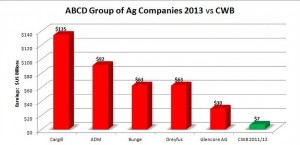
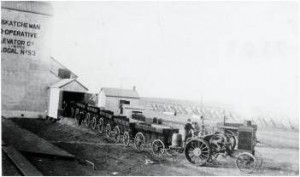
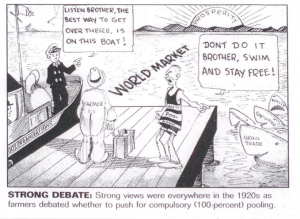
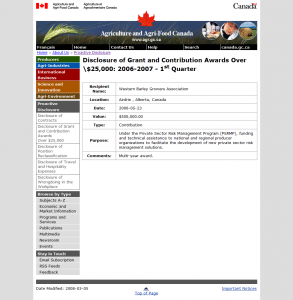

Sask ag Minister Lyle Stewart very nearly ‘ordered’ the Sask Wheat Devel Comm to join Cereals Canada at the SWDC annual meeting on Monday. From the podium. With no warning or communication of any kind.